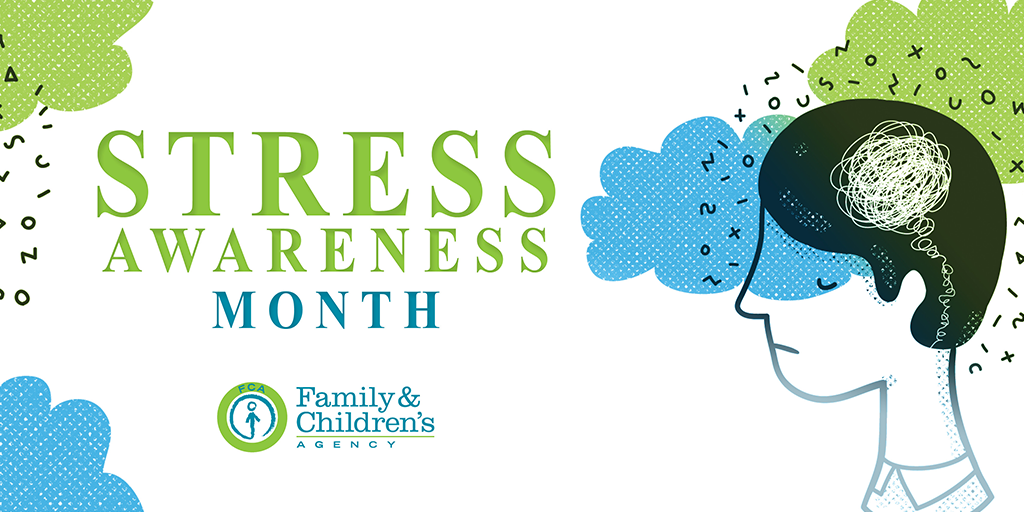
April is Stress Awareness Month and Licensed Clinical Social Worker and Director of FCA’s Family Support Program Tiffany McCarthy is our guest blogger.
Stress is hard to avoid but doesn’t need to take over one’s life. It is important that we understand what causes our stress and incorporate ways to help manage and lessen its impact. In addition, being aware of the signs stress is impacting children is vital to helping them develop coping mechanisms.
Parents play an important role in recognizing and helping their children manage times of stress. They also need to have awareness about how their own stress can have a corrosive impact on their child. Although children may not have developed the language skills to verbalize how they’re feeling, they will demonstrate how they are coping through their nonverbal behavior.
It is not uncommon to see stress in children demonstrated through regressive behaviors such as a return to thumb-sucking in an effort to self-soothe, changes in sleep patterns and nightmares, and changes in emotions such as increased clinginess, being sad, withdrawn, angry, or throwing tantrums.
Julia came to FCA with concerns about her 9-year-old son, Liam. Julia recently lost her job and was experiencing a high level of stress as a result. Adding to her frustration was that Liam was acting up at school – becoming physical and not listening to instructions. During a session, Liam said he didn’t have to listen to his mom because she didn’t listen to him. “All she does is yell about everything,” he said. When discussing his behavior at school, Liam said that if he was sent to the principal’s office his mom might pay attention to him instead of just applying for jobs.
In my work with parents the most important thing I tell parents they can do to help their children when they are experiencing stress is to be present. Note what this is like for the child and help them understand the feelings they’re having. When a parent recognizes the stress and what might be at the root of it rather than just suggesting that the feeling will “go away” or “isn’t real,” a child’s feelings are validated.
During these times it is especially important that parents also ensure that their child is eating and sleeping well as to allow their bodies to “recharge.” Now more than ever, as children have experienced some sort of shift in what they knew to be normal due to COVID-19, establishing a routine is also crucial. Make sure your child has some time away from virtual learning to get exercise and expose them to activities to help them feel grounded. This might be a deep breathing exercise with them when they are in a heightened moment of stress or helping them engage in an activity that lets them express how they are feeling such as through artwork or journaling.
Julia realized her stress about being out of work was negatively impacting Liam. With her FCA caseworker, Julia and Liam began discussing their feelings and how to show they were listening to one another. When Julia calmly explained the behavior she saw in her son that was concerning to her, Liam realized his mom was paying attention even when he felt she wasn’t. They began daily check-ins with each other to discuss their day, and Julia worked on her own stress and self-care strategies. Liam’s behavior improved, and their relationship strengthened.
Like children, adults who are experiencing times of stress also might experience changes in their sleep patterns, irritability, trouble regulating their emotions, grinding their teeth, and other physical reactions such as headaches.
Stress does not just impact one person – it is something that is often experienced by all members in a family. The onus is on the parents to not only understand what’s causing them stress but also to recognize the impact it has on their children and others in the home. Identify activities that help address these feelings such as a healthy work/home balance, incorporating regular exercise and time to engage in favorite activities or hobbies, eating well, and getting enough sleep.
One activity I often encourage my clients to try, regardless of age and easy to fit into a busy schedule, is a simple grounding exercise. In your present space, identify five things you can see, four things you can feel, three things you can hear, two things you can smell, and one thing you can taste. While this exercise isn’t meant to eliminate the stress permanently, the goal is to calm your mind and refocus you in the moment.
Creating activities that support each other during these times will lead to life-long skills and better health.